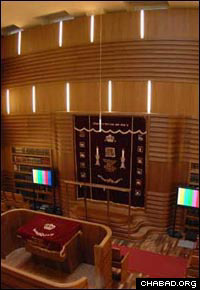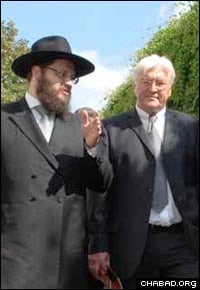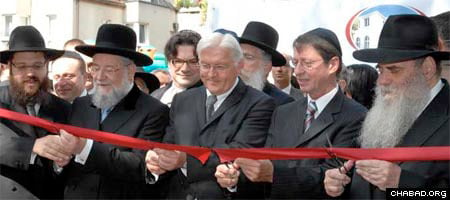Dozens of prominent political and religious figures, along with some 2,000 other people, descended on a Berlin building Sunday to take part in the official opening of Germany's first privately-funded Jewish center in more than 60 years.
With a gleam in his eyes and a smile on his face, Rabbi Yehuda Tiechtel, the 35-year-old co-director of Chabad-Lubavitch of Berlin, presided over the ceremony at the Szloma Albam House and Rohr Chabad Center in the German capital.
One year after moving into the former schooling center and power station of Berlin's largest electrical company – and 11 years since establishing the first synagogue in the living room of his and his wife Leah's apartment – Tiechtel pronounced the enormous building, which houses a synagogue, restaurant, student and education center, library, mikvah and Judaica shop, as central to the revival of Berlin Jewish life.
The panel of speakers, not the least of whom was German Foreign Minister Frank-Walter Steinmeier, seconded Tiechtel's assertion, proclaiming the rabbi "a major factor in the rebuilding of Jewish life in Germany today."
"We should not forget the past," said Tiechtel. "However, our aim is to get on with the future of Jewish life in Germany, to make sure that every single Jew has access to the Jewish experience."
Steinmeier acknowledged his country's tainted past with regard to the Holocaust, and lauded Chabad for looking towards the future.
"The opening is a joy in and for Germany, and a reason for gratitude after the insane crimes that are seared into the memory of Germany," he said. "Racism and anti-Semitism are unacceptable, particularly in Germany."
Ever since his arrival to Germany, Tiechtel has been running non-stop through the country's corridors of power lobbying local and federal governments, as well as foreign diplomatic missions, on issues of tolerance and coexistence. He appealed more for moral rather than financial support, reasoning that financial independence – with no governmental strings attached – would be the key factor in quickly developing programs.

"Trust in the vitality and future of the Jewish communities in Germany today can be measured by people's willingness to finance such centers out of their own pockets," said Nathan Kalmanowicz, a member of the board of the Central Council of Jews in Germany, which represents some 110,000 Jews living in 90 communities. "I know that this place will be far from being a museum. I am confident that it will be filled with life."
Most of those who turned out to witness the ceremony, which included the completion of a new Torah scroll, could hardly fit into the 350-seat sanctuary. Many followed the speeches by closed-circuit broadcast from video screens that had been set up throughout the building.
After the ceremony, revelers took to the streets for a Jewish festival in front of the Chabad center. Chasidic singer Avraham Fried provided the entertainment with Jewish lyrics and a mix of pop, rock and jazz fusion, while young and old alike danced in circles, clutching balloons.
In his remarks, Gideon Joffe, leader of Berlin's Jewish Community, praised the Tiechtels for focusing their attention on education for both adults and children.
"In the German business world today, we often bemoan the brain drain of highly educated and motivated people," he said, turning to the Chabad kindergarten and elementary school. "Here at Chabad, however, I see every sign of a brain gain."

Both former Israeli Chief Rabbi Israel Meir Lau and Rabbi Moshe Kotlarsky, vice chairman of Merkos L'Inyonei Chinuch, the New York-based educational arm of Chabad-Lubavitch, asserted in their orations that the lack of traditional Jewish values and education were the primary causes of assimilation, the greatest threat to the Jewish people today.
In attending, Kotlarsky represented the Rohr Family, whose patriarch, Sami Rohr of Bal Harbour, Fla., spent his childhood in Berlin before Kristallnacht, the pogrom in November 1938 that saw Jews throughout Germany beaten and deported, and thousands of synagogues, including the current home of the new Chabad center, ransacked.
Kotlarsky praised the Tiechtels for creating "this center, along with their countless sponsors and friends, as a way to give Jewish life a chance to survive and be revived."
"Success of this center will be measured by the people that come and learn here," he said. "The best thing is that no membership is required and there is no membership fee. … This is everyone's home."
For his part, Lau referred to the decimation of European Jewry at the hands of Germany's Nazi government during World War II. He declared that the dedication was proof that "the Final Solution collapsed."
"This is a new page in the history of the Jewish people in Germany," said Lau, the chief rabbi of Tel Aviv, Israel. "Our future is dependent on that of our grandchildren's. Here, future generations will find their way."








Join the Discussion